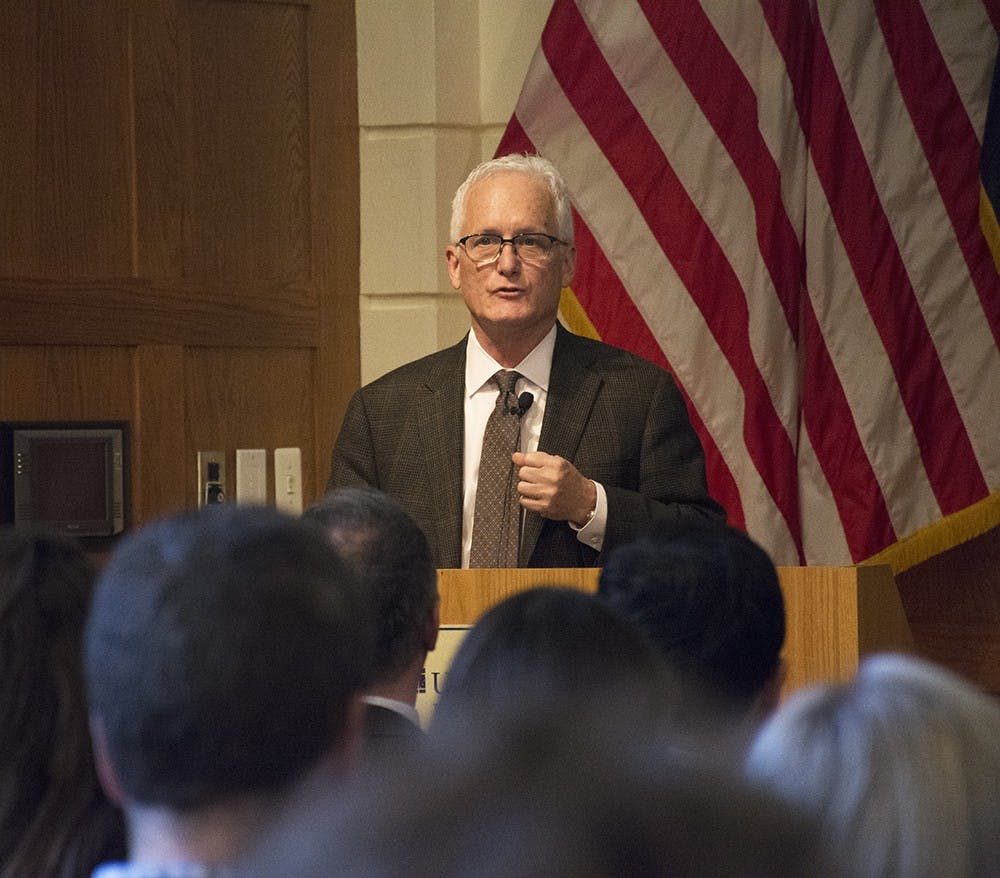J. Stephen Morrison, senior vice president of the Center for Strategic and International Studies, or CSIS, spoke at the Batten School Feb. 8 on the convergence of global security and public health issues in the Middle East and Africa.
Morrison opened by stressing the health ramifications of the current state of violence in these regions.
“We are in the midst of a widening, violent disorder, globally, that’s centered in the Middle East and North Africa, but by no means is it confined to that,” Morrison said.
Both international security and health will be at the forefront of U.S. foreign relations in the foreseeable future, especially with regard to the perpetual violence.
“It is generating a massive human crisis we haven’t been able to yet acknowledge or get our hands around, and the solutions, both politically and operationally in terms of health infrastructure and emergency response are elusive and are not gonna be in our grasp any time soon,” Morrison said.
As of last year, there were 60 million refugees and internally displaced persons worldwide, more than in the aftermath of World War II. This is creating a crisis in providing healthcare for those inflicted by the rampant violence.
Morrison emphasized the accumulation of many obstacles to providing healthcare in regions where refugees are fleeing or have fled, citing a lack of surveillance and health infrastructure as creating a high risk for disease outbreak.
“We had a major cholera outbreak in 2015 that spilled into Iraq — 4,200 cases of cholera,” he said. “It was in refugee camps, it was among 300,000 Syrians that had fled into Iraq. We’ve seen recurrent Polio outbreaks, we’re seeing heightened evidence of tuberculosis in populations moving into the borderlands.”
Morrison is also the director of the CSIS’s Center for Global Health policy, and was joined by Col. James A. Chambers, MD, of the U.S. Air Force for a question and answer session following the presentation.
Chambers surmised the complications of solving public health issues in a region with many safety and logistical concerns.
“What’s lacking is the effective political structure to work through, and a healthy security environment,” Chambers said.
Humanitarian aid workers themselves have been targeted by militants, making it difficult for international organizations to perform the duties of those failed health structures, according to Morrison.
“Combatants, both state and non-state combatants, are going after health infrastructure and health workers, deliberately, in an indiscriminate fashion,” Morrison said.
Moving forward, Morrison foresees an increase in direct U.S. involvement in the areas affected as the violence appears to be contagious, spreading to neighboring countries.
“My own feeling is that the U.S. is going to have to move closer to the region and create, find some way to deploy personnel in a secure fashion, much closer to what’s happening, because this is going to generate more and more outbreaks, and they’re not going to be confined to these countries themselves,” he said.
The event was the first in a series of interdisciplinary talks to be held by the Center for Global Health and the Global Policy Center at the Batten School.
Correction: A previous version of this article incorrectly referred to the Global Policy Center as the Foreign Policy Center.







